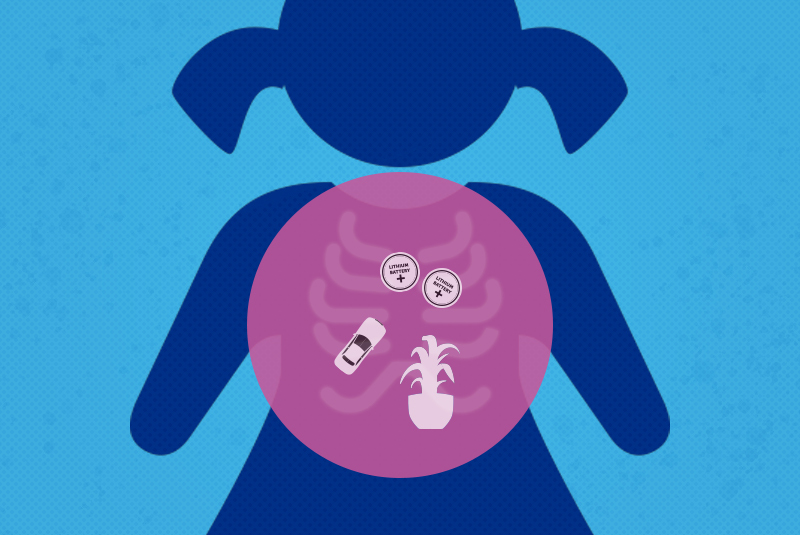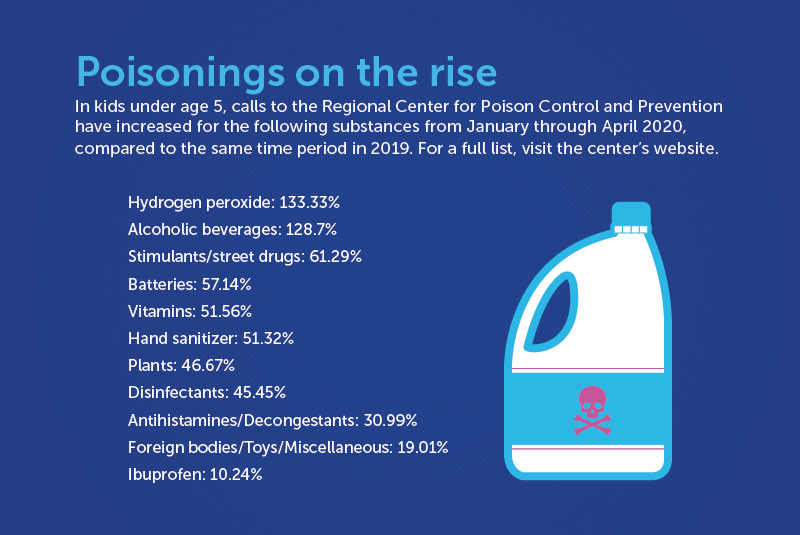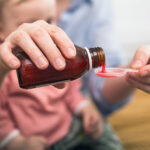COVID-19 pandemic may put kids at risk for accidental poisonings

In the effort to keep kids safe from the new coronavirus, families could be unwittingly putting them at risk for another threat: accidental poisonings. According to the U.S Centers for Disease Control and Prevention, calls to Poison Control Centers during January through March 2020 regarding accidental disinfectant and cleaning exposures increased by 20 percent compared to the same time period last year.
It’s a trend that the Regional Center for Poison Control and Prevention, located at Boston Children’s Hospital, is seeing as well — but it isn’t limited to household cleaners. “We’re seeing a rise in calls about accidental ingestion of many different substances such as personal-care products, pain killers, and vitamins,” says Alexandria Papadimoulis, the center’s education coordinator.
For example, calls about accidental ingestion of hydrogen peroxide increased by more than 133 percent in children age 5 and younger — the highest risk age group — from 2019 to 2020. Calls about household cleaning products have increased by more than 14 percent, while calls about hand sanitizer have risen by more than 51 percent.
More exposure, more risk
Such statistics aren’t necessarily unexpected: Families are cleaning and disinfecting more these days, putting kids in closer contact with toxic substances. Some parents have taken to trying to disinfect fruits, vegetables, and other foods with bleach — an extremely dangerous and potentially harmful practice, says Papadimoulis.
But there are some surprising increases, too. Calls about accidental ingestion of toys and other foreign objects have risen by 19 percent, batteries by more than 57 percent, and plants nearly 47 percent. The reason may be simple. “Most kids are at home all day right now,” explains Papadimoulis. “They have more exposure to such objects than they normally might.”

How to keep your family safe
Children ages 5 and younger are most apt to try to eat or taste foreign objects and toxic substances, but older kids are at risk, too. Here’s what Papadimoulis and her colleagues recommend to help keep your family safe.
Store substances safely. Keep cleaning products, personal-care products, medications, and other potentially harmful substances out of sight — ideally in higher cabinets or those with child-proof locks.
Do a home inventory. Check your home thoroughly for potential poison sites, including areas you think kids can’t access. The Regional Center for Poison Control and Prevention offers checklists and other resources to help guide you.
Treat medications wisely. Keep all drugs, including prescription and over-the-counter medications and vitamins out of reach. Dispose of expired medications by mixing them with coffee grounds, cat litter, or another unappealing substance, and then discarding them in the trash. Some parents refer to medications and vitamins as “candy” to encourage their children to take them, but this can backfire by making them too appealing to kids.
Think like a kid. “As adults, we would never consider eating a houseplant, dirt, or crayons,” says Papadimoulis. “But your child might.” Try to keep a close eye on your child — nothing substitutes adult supervision — and encourage them to ask before they eat or drink anything.
Call the Regional Center for Poison Control and Prevention at Boston Children’s (1-800-222-1222) if your child may have swallowed poisonous material, taken medication incorrectly, ingested household products, been exposed to biologic and chemical substances, or has had a bug bite or sting.
Get more answers about Boston Children’s response to COVID-19.
Related Posts :
-

Help your child manage anxiety about school violence
With news of school shootings and other violence often reaching children, parents sometimes grapple with how to help their child ...
-

Which pain medication is right for your child? What a pediatrician wants parents to know
There’s no shortage of safe and effective pain medications for children. Acetaminophen (commonly known as Tylenol), ibuprofen (Motrin, Advil), ...
-

Model enables study of age-specific responses to COVID mRNA vaccines in a dish
mRNA vaccines clearly saved lives during the COVID-19 pandemic, but several studies suggest that older people had a somewhat reduced ...
-

New insight into the effects of PPIs in children
Proton-pump inhibitors (PPIs) are frequently prescribed to suppress stomach acid in patients with gastroesophageal reflux disease (GERD). Prescribing rates of ...





